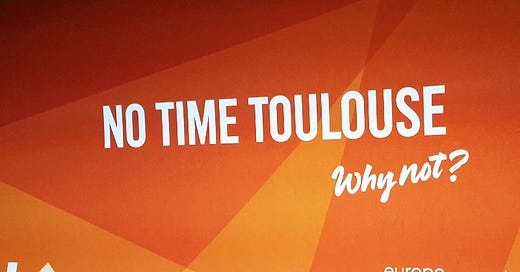The Guardian newspaper recently asked scientists who specialize in climate change to answer this question: “What are the most powerful climate actions you can take?” The scientists did not mention cloth shopping bags or laundry sheets or green cleaning products. Instead, they hit the important points:
Vote for representatives who pledge strong climate action
Reduce flying and fossil fuel-powered transport in favour of electric and public transport
Reduce meat consumption
Reduce home heating or cooling emissions
The important things are often the most difficult, or expensive. But not necessarily: reducing meat consumption shouldn’t be such a big deal, and we can substantially reduce home heating and cooling emissions without spending much money at all. But the political part is very difficult indeed. That first point should be phrased differently: we don’t just need to vote, but to elect. Then we have to support politicians who take climate change seriously and approach it with determination and wisdom. Wherever you are, there are voting options that matter. (While I am grateful for all the Never Trump Republicans, there is a noticeable avoidance of climate change in their writing. Here’s an example.) But first things first: apart from all other risks, electing the former US president to office again would be a disaster for the planet and our children’s future.
Also worth keeping in mind: war not only has devastating environmental consequences, but is often driven, in part, by conflicts over resources - in the Middle East, access to and control of water is a major political issue and too often ignored.
But what I want to talk about today is the second point on the scientists’ list: air and car travel. After 3 years when our travel was drastically curtailed, everyone seems to be getting on the road or on a plane. I think of this when I read advice about green meals or going plastic free, remembering the Norwegian study showing that green families and other members of environmental groups are no more ecofriendly than people who don’t bother. The problem is that a lot of people who recycle, or bicycle to work, or buy green products to reduce their carbon footprint have something else in common: they travel more during holidays and vacations, which nullifies their attempts at home to reduce their impact on the planet. Kristin Linnerud, one of the authors, commented, “When we sacrifice something, we think we deserve a reward” (Center for International Climate Change and Environmental Research–Oslo).
The center’s FLYWELL project is tackling that issue, first by acknowledging that “Travelling for work, leisure, and family is often associated with experiences of relatedness, belonging, physical health, autonomy, and freedom.”
The airline industry, in spite of what we’d like to believe, cannot be decarbonized simply through increased efficiency and technical improvements. What’s the solution? Trains, for one thing, and timing our travel differently: fewer trips, longer stays.
While I’m not a fan of the US train operator Amtrak, which seems still to be operating as if we were in the 1970s, it’s what we have here and now, and what we have to start with. Amtrak is running a summer sale until tomorrow (16 May), and if you are planning a trip that could be made by train, do take a look. I’d love to hear about your summer train travel, too. Myself, I’m tempted by their $499 pass - a month of travel anywhere in the US. I love the idea of crossing the country, making a side trip or two, and riding both the California Zephyr through the Rockies and the Empire Builder through Big Sky country and Glacier National Park. If you have train travel recommendations, or stories, I’d love to hear them.
And how about eating less meat? I remember a journalist asking me what on earth this had to do with climate change, but that idea seems to have percolated through. But for many people it sounds either like deprivation or too much effort, or gets pitched as a political issue. In the US, there’s a weird connection between guns and gas stoves and hamburgers - all things that Democrats supposedly want to ban. (I have, incidentally, realized that there is one good reason for ordering a hamburger when you go out: at least it will be cooked fresh, unlike so much restaurant food these days.)
Some vegan recipes are too uncanny valley (as is fake meat). But lots of familiar dishes in cuisines all over the world are vegetarian or vegan without the label. You can pick up any Asian or provincial European cookbook and find lots of ideas for meatless meals. Chinese cuisine rivals French in terms of refinement, but it developed in a land of scarcity. For some favorite recipes, cookbooks, and links, just click to Home Ecology.
My main project at the moment is the new version of The Great Good Place. An early revelation was that the structural changes that will help to create and nurture third places are exactly the kind of changes we hear about from people working on sustainable community planning: 15-minute cities, walkable neighborhoods, local business investment, and more. I’ll be talking about third places next month at the New Jersey Future conference, and in September at UMass’s Department of Landscape Architecture and Regional Planning.
Meanwhile, I’m gathering ideas from around the world. While third places are always face to face, it certainly is great to be able to Zoom/ Teams/ Google/ Whatsapp with people working on different aspects of sociability. Because France has made “third place” an official policy, I was especially keen to discuss the topic with Antoine Burret, who has recently published a book on the subject. We recorded our conversation as a video and podcast, available here.
A conversation with Antoine Burret
Antoine and I started talking last summer while he was in final months of work on Nos Tiers-Lieux (Our Third Places), the first book on the subject to be written and published in France. Here we pick…









I have been a big fan of Amtrak, and have not flown between Washington and New York since 9/11. (Confession: I will fly on this trip because it is much easier to get to LaGuardia than to Penn Station to get home from Queens.) But my last Amtrak trip was a disaster because of poor communications about a train delay. I could have traveled from the Alexandria, Virginia, station to Union Station in DC, and would have upgraded to Acela if I had known more details about delays and my options. In NYC, my partner is savvy about the bus and subway apps, and figuring out how to navigate the city. He is an inspiration to me in trying to figure out the options.